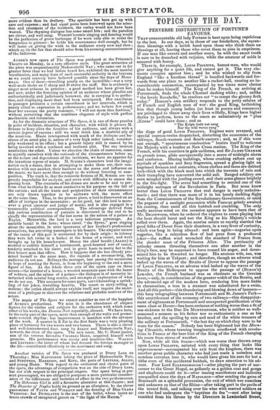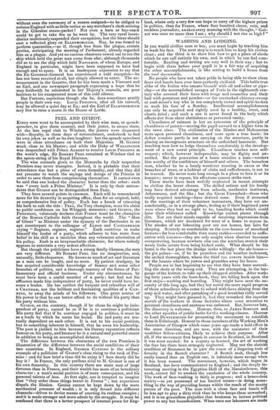TOPICS OF THE DAY.
PERVERSE DISTRIBUTION OF FORTUNE'S FAVOURS.
THAT unaccountable old lady Fortune is bent upon being capricious to the last. In our days, as in those of our forefathers, she squan- ders blessings with a lavish hand upon those who think them no blessings at all, leaving those who covet them to pine in emptiness. If one man like sweets and another sours, he with the sweet tooth is sure to be drenched with verjuice, while the amateur of acids is smeared with honey.
There is, for example, Louis Pim:rem honest man, who would give anything for a quiet life, and cannot get it. The very ele- ments conspire against him ; and he who wished to slip from England "like a knotless thread" is bandied backwards and for- wards from one place to another like a racket-ball, causing no in- considerable commotion, accompanied by ten times more clatter than he makes himself. The King of the French, on arriving at Portsmouth, finds the whole Channel dashing white; and, unlike "the lovely Rosabelle," he resolves not "to tempt the gloomy firth today." Heaven's own artillery responds to the petty salutes of of French and English men of war : the good King, bethinking him that though young ladies (at least in poems and romances) are privileged to throw away their lives wilfully, Kings have higher duties to perform, bows to the omen as submissively as "pins 1Eneas" could have done ; and so
"The Kelpie bath not sung Nor the wild waves rung"
the dirge of good Louis PH11.11.143. Engines were reversed, and special express-trains despatched, disturbing the economies of the railways, South-western and South-eastern ; and, as if this were not enough, "spontaneous combustion" bestirs itself to welcome his Majesty with a bonfire at New Cross station. The King of the French, with his courtiers in gala uniforms, and Sir JAMES GRAHAM en grande tenue, glide unexpectedly into a scene of midnight alarm and confusion. Blazing buildings, whose crashing rafters cast up myriads of sparkles and fiery fragments, spread a glaring light on begrimed firemen and assistants, whose clothes and faces are dabbed inch-thick with the black mud into which the torrents of rain and their trampling have converted the solid soil. Ranged soldiery are seen mingled with the jostling crowd, and their arms glance brightly in the fire-light. The scene had something to remind one of the midnight outrages of the Revolution in Paris. But none knew better than Louis PHILIPPE that real danger is rarely melodra- matic; and that there was more of it in his lonely darkling flight from the Commissioners of the Revolutionary Government, or amid the pageant of a sunlight procession while PIESCHI grimly awaited his coming, than amid all this hubbub and crackling. The only really anxious mind on the occasion appears to have been that of Mr. BRAIDWOOD, when he ordered the engines to cease playing lest the hose should burst and wet the King as his Majesty's vehicle rolled over them. Again, the sunrise salute to royalty startled the good folks of Dover from their slumbers, in a very fever of curiosity, which was long in being allayed : and here again—auguries upon auguries, like a relentless flow of bad puns from a professed joker—the ruffian wind wrenched the standard of France from the slender mast of the Princess Alice. The pertinacity of unlucky omens thrusting themselves one after another in the King's face, may be supposed to have roused his anger, and deter- mined him to be thwarted no longer. His anxious wife, too, was waiting for him at Treport ; and therefore, though an adverse wind lashed up the waves of the Straits of Dover to oppose the passage of LOUIS PHILIPPE, as an adverse wind lashed up the waves of the Straits of the Hellespont to oppose the passage of (Briton's) Leander, the French husband was as obstinate as the Grecian lover,—only, in consideration of the greater width of the Straits, and the advanced age of the modern hero, rendering him more liable to rheumatism, a toss in a steamer was substituted for a swim. And all this pother—this thundering and blowing down of banners— this busy telegraphing between Portsmouth and St. James's Park— this unsettlement of the economy of two railways—this disappoint- ment of sightseers at Portsmouth and unexpected gratification of the same class at Dover—has been ominous of nothing worse than a fit of sea-sickness to the Due DE MONTPRNSIER, who is neither so well- seasoned a seaman as his father nor so enthusiastic a one as his brother, and the spoiling by rain and mud of the white trousers of the military at Portsmouth, "the last day on which they were to be worn for the season." Nobody has been frightened but the Morn- ing Chronicle, whose teeming imagination overflowed with revolu- tions in France at the bare hint of the King of the French changing his route from stress of weather.
Now, while all this fracas—which was worse than thrown away upon Louis PHILIPPE, satiated with every thing that looks like empressement—accompanied his exit from the kingdom, there Was another great public character who had just made a noiseless and noteless entrance into it, who would have given his ears for but a tithe even of this accidental hubbub, to draw attention to his ad- vent. Poor Lord ELLENBOROUGH!—after playing the part of suc- cessor to the Great Mogul, as gallantly as a golden coat and gongs and elephants could do it—after issuing manifestoes and bulletins unequalled since the days of NAPOLEON—after sending the gates of Somnauth on a splendid procession, the exit of which was nameless and unknown as that of the Rhine—after taking part in the perils of the tented field, and talking over his wine with scarred soldiers as one who had undergone the " bapteme du feu "—and after being tumbled from his throne by the Directors in Lesdenball Street, without even the ceremony of a reason assigned—to be obliged to reftterEngland with as little notice as any merchant's clerk arriving in the Gibraltar steam-packet ! Not even a barn or hay-stack could be got to take fire as he went by. The very rural incen- diaries maliciously suspended their occupation, lest the blaze should cast a reflected glory on ELLENBOROUGH. Nay, he was forced to perform quarantine,—as if, though free from the plague, certain parties, anticipating the meeting of Parliament, already regarded him as a plague. And yet no curious observers rowed out to see the ship which held the great man come from afar ; although thousands did so to see the ship which held NAPOLEON, of whom Europe, and England in particular, might have been supposed to have had enough and to spare. It is an inadequate expression to say that the Ex-Governor-General has experienced a cold reception—he has not been received at all, but simply allowed to enter. The an- nouncement in the Gazette, that he has been made a Viscount and an Earl, and one newspaper paragraph expressing a hope that he may forthwith be reinstated in her Majesty's councils, are poor lenitives to his exasperated sense of this cold silence. But Fortune, capricious though she be, does sometimes gratify people in their own way. Louis PHILIPPE, after all his turmoil, may be allowed a quiet day at Eu ; and the Earl of ELLENBOROUGH may live to raise a storm in the House of Lords.



























 Previous page
Previous page